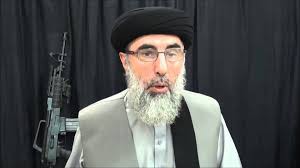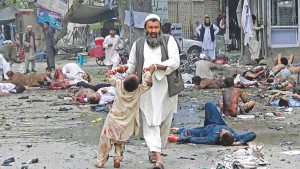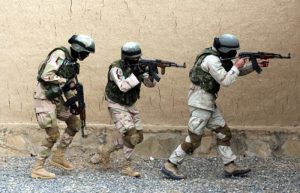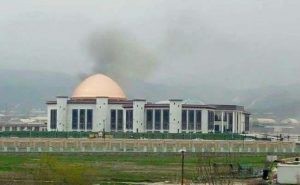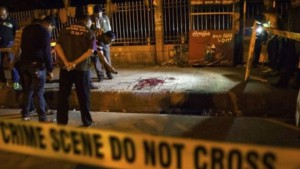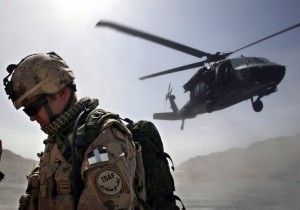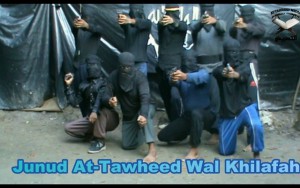Since his days as a C.I.A.-backed Afghan guerrilla leader against the Soviets in the 1980s, the former prime minister and perpetual insurgent Gulbuddin Hekmatyar has always seemed to be negotiating his next shift of alliances.
Now, with his Hezb-i-Islami militant group nearly eclipsed by the Taliban, Mr. Hekmatyar, 68, is once again working a deal — this time to formally reconcile with the Afghan government for the first time since the end of the country’s civil war.
After years of failed overtures, representatives of Mr. Hekmatyar, whose whereabouts is unknown, are now said to be finalizing a peace agreement with the struggling government of President Ashraf Ghani, according to representatives from both sides. If signed, the agreement would allow Mr. Hekmatyar to return to Kabul for the first time since 1996. That was when the Taliban pushed him out of power after he had negotiated a deal to become prime minister in return for ending his insurgency against the government.
For Mr. Hekmatyar, history seems to repeat like that.
But the timing of the efforts to make peace with Mr. Hekmatyar’s small faction of the insurgency this time has raised questions in Kabul. Mr. Ghani’s government, failing to persuade the Taliban to come to the table this winter, is hoping that a quick deal with Mr. Hekmatyar, which evaded the previous administration, would bring it much-needed good news. The government’s peace body, the High Peace Council, also needs to show some results for the hundreds of millions of dollars in donor money it has spent on the reconciliation process.
Many fear Mr. Hekmatyar, known for his habit of breaking alliances, could be a larger political headache in Kabul than he is a military one in the battlefield, at a time when Mr. Ghani’s coalition administration is already bogged down with infighting. Although forces loyal to Mr. Hekmatyar have attacked sporadically — including a 2013 car bombing that killed 16 people, including six American advisers — they have never been considered as serious a threat as the Taliban or the Haqqani network.
Still, Mr. Hekmatyar is exceptionally divisive. He is accused of causing the deaths of thousands during the civil war, including the indiscriminate shelling of Kabul — much like rival warlords who are now allied with the government or have positions within it. After receiving copious cash and weaponry from the Americans during the war against the Soviets, he threw in his lot with remnants of the Communist government, then briefly with Taliban, and then Al Qaeda. In July last year, he was even rumored to have pledged allegiance to the Islamic State, though his aides later denied it.
Through it all, he has remained a prolific writer. He frequently sends letters to his commanders and has published dozens of books on political and religious matters, with titles including “Afghanistan – Another Vietnam for America,” “Dreams and Interpretations,” and “Bush, the King of Liars.” More recently, he has also taken to recorded video messages, modulating his voice like a state-TV anchor as he recites long lectures and answers recorded questions.
Abdul Qayoum Sajjadi, a member of the Afghan Parliament, said the government had resorted to dealing with Mr. Hekmatyar “for political purposes and public opinion” after failing to bring the Taliban to the table.
“It may not drastically change anything to restore peace since currently he doesn’t command any fronts against the government,” Mr. Sajjadi said. “But still, having him inside is better than having him outside.”
Perhaps sensing an opportunity in the Ghani government’s weakness, or feeling urgency of his own, he has eased his longstanding demands, which have included an unconditional and total withdrawal of all foreign forces.
According to officials on both sides of the negotiation, some of the last points of disagreement were the timing of removing Mr. Hekmatyar and the Hezb-i-Islami militant wing from American and United Nations terrorism lists, and whether Mr. Hekmatyar is willing to renounce relations with extremist groups outside Afghanistan.
Mr. Hekmatyar’s group is demanding to be taken off the terrorism lists before signing the agreement, while American officials have said the process takes time and can happen only after a formal request from the Afghan government when the agreement is signed, according to two Afghan officials close to the talks who spoke on condition of anonymity because the negotiations were continuing.
In the meantime, the Americans have demanded Mr. Hekmatyar renounce relations to all global extremist groups. But Mr. Hekmatyar’s representatives say they can go only as far as groups threatening Afghanistan, because there is no universal definition of terrorism.
Karim Amin, a negotiator for Mr. Hekmatyar in recent talks, said: “How is it possible for Hezb-i-Islami to accept if Israel calls a group or party terrorist? It is not acceptable to us in any way. Similarly, if Burma calls a group terrorist, should we also consider that group terrorists? No way: We are not going to do that, never.”
The Afghan government is agreeing to provide Mr. Hekmatyar and his group’s leadership with facilities to resettle in Kabul.
Maulavi Atta ul Rahman Salim, the deputy head of the High Peace Council who has been negotiating with Mr. Hekmatyar’s team, said they had agreed to provide Hezb-i-Islami leadership with residences and an office. “In fact, we have seen a couple of places, which are yet to be finalized.”
In addition, the leadership would be provided with vehicles and guards. All that together would amount to at least $4 million a year, according to one senior Afghan official involved in the talks, speaking on condition of anonymity to characterize private negotiations.
Mr. Hekmatyar is also asking for townships in Afghan to accommodate thousands of residents from a large refugee camp in Pakistan that his group has used as a base since the 1980s.
If Mr. Hekmatyar does eventually make it to Kabul, he will find himself in an awkward place, lagging behind foes he fought for many years. During his 14 years on the sidelines, he missed the lucrative wave of American spending and favor — and the image rehabilitation — that his civil war rivals have enjoyed.
At the same time, some of his former affiliates have also prospered without him. The political wing of Hezb-i-Islami has distanced itself from Mr. Hekmatyar over the past decade, and several members went on to become cabinet ministers in the Kabul government after the Taliban’s ouster in 2001.
Mr. Amin, Mr. Hekmatyar’s chief negotiator who insists his leader is inside Afghanistan and not in Pakistan, where intelligence reports have placed him, would not comment on the preparations for his eventual return.
During his comeback in 1996, those involved motorcades of white-uniformed guards and Mr. Hekmatyar’s portraits mounted on tanks. It is unclear whether any faction in Kabul, friend or foe, would go that far for him again.
nytimes.com
